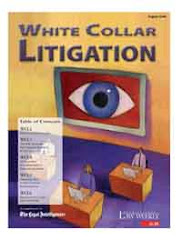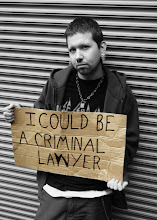Prior to the Enron implosion in 2001, most lay folk had never really heard about white collar crimes. Most law students read about it in law school and few firms had a white collar litigation practice. Today, however, white collar litigation is fast becoming one of the hottest facets of the legal profession. With the ever increasing reports of corporate scandals and corruption, prosecutors have resolved to attack corporate corruption with fever-pitch fervor.
The Enron fiasco aroused intense scrutiny by prosecutors in an effort to combat what they believe is the corporate virus invading the integrity of corporate America. From healthcare fraud to insider trading and stock option backdating, corporate America is rife with intriguing and salacious fodder for Government prosecution and late night TV jokes. White collar litigation has a way of debunking everyone from high ranking CEOs to hedge fund advisors, and even attorneys.
Because most white collar litigation involves sophisticated complicated transactions and analyses, attorneys have to be at the top of their game. The cases are usually document-intensive and involve months, perhaps, years, of document collection, review and analyses, numerous witness interviews and countless rims of white papers. Walk into any firm undertaking a white collar litigation case and you’ll find hundreds of boxes, binders and burned out junior associates toiling over complex legal issues and sometimes, very interesting facts.
Ask any white collar litigator about email review – ah, those dreaded emails – the site of the deepest darkest secrets of some of the most revered CEOs, CFOs and other high-level company executives……… Few names come to mind – Ken Lay, Jeff Skilling and Martha Stewart. Every white collar litigator dreams of clients like Martha Stewart or Ken Lay.
Prosecutors salivate at the thought of prosecuting some of the more high profile cases. What’s not to like? The fame and notoriety is priceless. But most importantly, the Government continues to send the message that it has a tremendously low tolerance, if any, for white collar crime and will aggressively prosecute what it perceives as “greedy” corporate officials.
 Over the past ten years, the Government has pursued corporate wrongdoers with a vengence. Luckily for the alledged defendants the defense attorneys who represent them are very familiar with Government investigations. These days, most of the white collar defense attorneys used to be on the side of the bar. Former prosecutors are finding themselves sucked into the wonderful mire of top notch defense firms. They bring with them the invaluable experience gained from prosecuting like cases and the "inside scoop" of what really goes on in these investigations. It is a small world, indeed - it is probable that most of these these defense attorneys know the prosecuting attorneys, personally or through reputation. These attorneys travel in small circles and regularly refer business to each other due to scheduling conflicts or the like. The vast experience of these former prosecutors is a great asset to navigating the murky, complex, and sophisticated nature of most white collar litigation.
Over the past ten years, the Government has pursued corporate wrongdoers with a vengence. Luckily for the alledged defendants the defense attorneys who represent them are very familiar with Government investigations. These days, most of the white collar defense attorneys used to be on the side of the bar. Former prosecutors are finding themselves sucked into the wonderful mire of top notch defense firms. They bring with them the invaluable experience gained from prosecuting like cases and the "inside scoop" of what really goes on in these investigations. It is a small world, indeed - it is probable that most of these these defense attorneys know the prosecuting attorneys, personally or through reputation. These attorneys travel in small circles and regularly refer business to each other due to scheduling conflicts or the like. The vast experience of these former prosecutors is a great asset to navigating the murky, complex, and sophisticated nature of most white collar litigation. 

